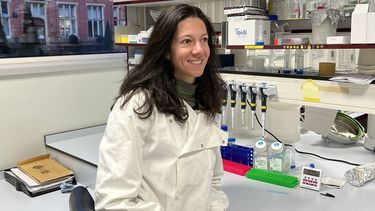- Scientists from the University of Sheffield are investigating how breast cancer cells survive and grow, thanks to new funding from Breast Cancer Now
- The research could uncover a cancer-specific process which may lead to the development of treatments that come with fewer side effects for patients, as healthy cells won’t be affected
- Cancer cells are fast-growing but face tough conditions, in part due to their lack of proper blood supply which means they don’t have many nutrients available to them. To survive and grow, they must find ways to get these essential nutrients, such as glucose and amino acids
Researchers from the University of Sheffield are investigating how breast cancer cells survive and grow, thanks to new funding from Breast Cancer Now.
Dr Elena Rainero from the University of Sheffield’s School of Biosciences, has been awarded almost £250,000 to study how breast cancer cells use alternative food sources to grow and spread, and the role a protein called a2b1 integrin plays in this process.
Cancer cells are fast-growing but face tough conditions, in part due to their lack of proper blood supply which means they don’t have many nutrients available to them.
To survive and grow, they must find ways to get these essential nutrients, such as glucose and amino acids.
The ability to adapt to challenging conditions and find alternative sources of food is more common in invasive breast cancers, where cancer has spread from the milk ducts into the surrounding tissue of the breast.
Dr Elena Rainero and her colleagues previously found that breast cancer cells can use the supportive structures of cells as food, allowing the cancer to grow despite the lack of normal nutrients within tumours.
They discovered that a protein called integrin a2b1, found on the surface of cells, helps breast cancer cells do this. The researchers now want to understand how the protein moves inside the cells and reaches the cells’ digestive system.
They will use mouse models to block integrin a2b1 with drugs and assess the impact this has on a tumour’s growth and spread to other parts of the body – when it spreads the disease becomes incurable secondary breast cancer.
This research could uncover a cancer-specific process which may lead to the development of treatments that come with fewer side effects for patients, as healthy cells won’t be affected.
Dr Elena Rainero said: “We’ve known for a long time that cancer cells use nutrients to survive in different ways to healthy cells. They can also use alternative food sources to fuel themselves.
“Surprisingly, there are relatively few ways in which cancer cells can do this. This means that understanding how breast cancer cells gather and use nutrients could lead to new treatments.”
Dr Simon Vincent, Breast Cancer Now’s Director of Research, Support and Influencing said: “This project will give us a better understanding of exactly how breast cancer cells sustain themselves, despite a lack of normal nutrients. And it could be an important step towards developing drugs that block the process used by cancer cells to survive.
“With around 55,000 people being diagnosed with invasive breast cancer every year in the UK, we urgently need to find new ways to treat people and prevent deaths from this devastating disease.”
Tracy Nicholls, 60, from Sheffield, was diagnosed with breast cancer in 2020 after attending a routine mammogram appointment.
“My diagnosis came as a complete bolt from the blue. I had no lump or other symptoms and no family history of breast cancer. I was in shock and struggled to process the news. I had lost my mum just months before and was already dealing with a lot at the time,” said Tracy.
Tracy underwent surgery to remove the tumour in her breast and had seven lymph nodes removed.
She had 21 rounds of radiotherapy and had to attend nearly all the sessions alone due to the Covid-19 pandemic.
She added: “I was very lucky that my cancer was caught early and was treatable. I can’t stress enough the importance of attending your routine mammogram, it saved my life.”
After completing treatment, Tracy started on a course of anastrozole, a hormone therapy drug, to reduce the risk of breast cancer returning but she says the fear of a recurrence never goes away.
Tracy said: “Anyone that has been through breast cancer worries about it coming back. It can be hard to push those feelings aside but knowing that new research like this is taking place, to help increase our knowledge and understanding of breast cancer, gives me hope for the future.”
This research supports the University of Sheffield's cancer research strategy. Through the strategy, the University aims to prevent cancer-related deaths by undertaking high quality research, leading to more effective treatments, as well as methods to better prevent and detect cancer and improve quality of life.
Learn more about the University of Sheffield's cancer research strategy
Find out more about Breast Cancer Now

